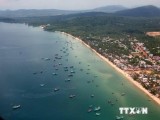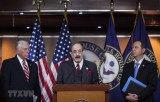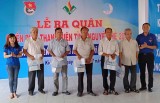Vietnam respects int’l law during marine sovereignty safeguarding: official
Over the years, Vietnam has consistently complied with the 1982 United Nations Convention of the Law of the Sea (UNCLOS) and taken peaceful measures in line with this treaty to safeguard its sea areas, a Foreign Ministry official has said.

A soldier on duty on the Co Lin island of the Truong Sa island district
In a recent interview with Vietnam News Agency, Nguyen Manh Dong, head of the maritime affairs department at the ministry’s National Boundary Commission, reiterated Vietnam’s consistent policy that all international disputes, including those in the East Sea, must be resolved by peaceful measures as regulated in the UN Charter and the UNCLOS. This was also affirmed in the National Assembly’s resolution ratifying the UNCLOS on June 23, 1994, the country’s 2012 Law of the Sea, as well as many legal documents.
On this basis, Vietnam handled the demarcation of and fisheries cooperation in the Gulf of Tonkin with China in 2000, maritime demarcation with Thailand in 1997 and continental shelf demarcation with Indonesia in 2003. It also signed an agreement on joint oil and gas exploitation with Malaysia in 1992 and a treaty on historical waters with Cambodia in 1988.
The country is also promoting talks on the demarcation of the sea area off the mouth of the Gulf of Tonkin with China and the demarcation of the exclusive economic zone with Indonesia, he said.
Dong noted Vietnam always respects neighbouring countries’ sea areas in line with the UNCLOS. It has carried out communications to educate its fishermen and others operating at sea to adhere to international law and the UNCLOS and not violate foreign waters.
At the same time, it has also resolutely safeguarded its sea areas, he said, adding that in terms of the exclusive economic zone and the continental shelf specified in line with relevant articles of the UNCLOS, the country has persistently and resolutely struggled to protect them through peaceful measures like using diplomatic contacts to point out violations under the UNCLOS’s regulations, sending diplomatic notes to show opposition, and circulating diplomatic notes at the UN.
Vietnam has also affirmed that it reserves the right to use peaceful measures in accordance with international law to protect its rights and legal and legitimate interests under the UNCLOS, the official said.
Dong went on to say that Vietnam was one of the 107 states that signed the UNCLOS in Montego Bay, Jamaica, shortly after the convention opened for signing in December 1982. It also participated in the agreements relating to the implementation of this treaty.
Over the years, the Southeast Asian nation has always respected and fulfilled all its obligations under the UNCLOS, as seen through the adaptation of domestic laws to the UNCLOS, the continual perfection of the national legal system on the sea and the use of the convention’s regulations as a basis for resolving demarcation issues and promoting maritime cooperation with neighbouring countries.
With regard to bilateral aspects, Vietnam has conducted joint marine science research with the Philippines in 1996, 2000, 2005 and 2007. Based on these successes, the two countries have institutionalised bilateral marine cooperation and expanded the cooperation from marine science research to new fields like marine environmental protection, search and rescue, and oil spill response.
In terms of the partnership in less sensitive areas at sea with China, the two countries have successfully implemented a project comparing the Holocene-epoch deposits in the Red River and Yangtze River deltas, and worked together to release breeding fish and protect aquatic resources in the Gulf of Tonkin.
They are stepping up collaboration in search and rescue, maritime affairs, the opening of a hotline to deal with fisheries-related incidents at sea, and implementation of some new projects on environmental protection in the Gulf of Tonkin.
Dong said Vietnam has also set up mechanisms of joint patrol at sea with Thailand in 1998, Cambodia in 2002 and China in 2005 to maintain order in relevant sea areas, enhancing ties between relevant forces of Vietnam and the countries, and fostering neighbourliness.
Within the framework of ASEAN, Vietnam has also taken part in cooperation on East Sea matters, including the ASEAN Senior Transport Officials’ Meeting, the ASEAN Transport Search and Rescue Forum, the ASEAN Maritime Forum, and the Sub-Committee on Marine Science and Technology.
To implement the Declaration on the Conduct of Parties in the East Sea between ASEAN and China and negotiate a Code of Conduct in the waters, it has proposed many initiatives and made contributions for the sake of the parties concerned and for ASEAN-China maritime cooperation, he noted.
Additionally, the country has engaged in activities within the framework of international mechanisms established under the UNCLOS, the official said, noting it has fully participated in the meetings of the UNCLOS member states held annually at the UN General Assembly and the meetings of the International Seabed Authority. It has also supported the enhancement of activities of the Continental Shelf Boundary Commission and for a stronger role of the International Tribunal for the Law of the Sea.
These facts are all vivid evidence demonstrating the Vietnamese Government’s goodwill, activeness, resolve and commitment to respecting and implementing the UNCLOS. They also show the country’s efforts and consistent policy to cooperate to handle sea-related disputes and differences by peaceful means in conformity with international law, including the UNCLOS, thereby fostering cooperation with other countries and protecting its rights and legitimate interests in the East Sea, Dong added.
He stressed that all countries, regardless of their development level, size and influence, need to join efforts, on the basis of goodwill and respect for law and through practical actions, to maintain a favourable environment for their own sake and for the sake of the international community.
VNA
Vietnam Coast Guard vessel visits Philippines
 Vietnam attends 14th annual East Sea conference in US
Vietnam attends 14th annual East Sea conference in US
 Delegation visits Truong Sa island district, platform
Delegation visits Truong Sa island district, platform
 Overseas Vietnamese visit Truong Sa, DKI platform
Overseas Vietnamese visit Truong Sa, DKI platform
 Vietnam, China coast guards finish joint patrol
Vietnam, China coast guards finish joint patrol
 All activities in East Sea must comply with int’l law: deputy spokesperson
All activities in East Sea must comply with int’l law: deputy spokesperson
 Vietnam resolutely refutes illegal claims in East Sea: Spokeswoman
Vietnam resolutely refutes illegal claims in East Sea: Spokeswoman
 Vietnam deeply concerned about recent tension in East Sea: Spokeswoman
Vietnam deeply concerned about recent tension in East Sea: Spokeswoman
 DK1 platform stands firm on the wave front
DK1 platform stands firm on the wave front
 Sick fisherman saved at sea off Hoang Sa islands
Sick fisherman saved at sea off Hoang Sa islands



